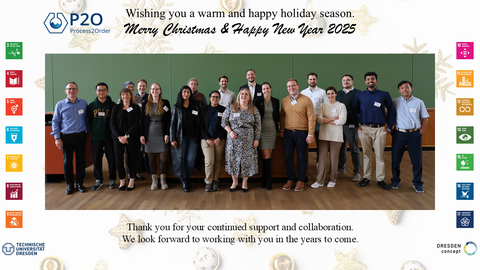Jahresrückblick 2024
As the holiday season is upon us, we find ourselves reflecting on the past year and those who have helped to shape the mission and research agenda of the Process-to-Order Group. 2024 was a year of intensive joint learning, focusing and re-alignment of our research topics:
P2O-Lab Learning Factory
2024 was a year of big changes for the Process-to-Order Lab Learning Factory. In May of this year, Isabell Viedt and Hannes Lange took over the roles of Managing Directors from Anselm Klose and Jonathan Mädler. Furthermore, the P2O-Lab team worked tirelessly to reshape the entire lab space by building and automating the two infrastructure backbones BB01 and BB02 to enable flexible modular process chains. This progress was presented in October during the 1st P2O-Lab Symposium, which provided an exchange platform between P2O-Lab, industry, and academic partners.
Model Exchange and System Simulation
The group investigates how to support collaborative modeling and simulation of complex, networked systems such as modular electrolysis, communal waste sorting, or speciality manufacturing A strong focus is on the exchange of the specific models between the involved parties, e.g. vendor and owner-operator or laboratory and plant, and their integration towards a Digital Twin of the system as an enabler for holistic process development, scale-up and plant-wide optimization.
Hybrid Modeling, Simulation & Optimization
The group investigates the potentials, boundaries and pitfalls of the integration of data-driven and mechanistic modeling approaches in very different domains such as microalgae growth, plant fouling prediction, or optimal sensor placement for value-added services in brownfield plants. Results have been presented at international conferences and have been transferred to the "Machine Learning for Process Engineers" course.
Smart Architectures
Together with partners from industry and academia, the group is investigating automation as a service, containerization, virtualization and the seamless, scalable, safe, and secure integration of AI pipelines into automation systems. Research methods and results have not only been successfully discussed at international conferences but have also been integrated into the interdisciplinary "Process Automation" course for both chemical engineers and automation engineers.
Modular Operations
The group was established in 2024 with a research focus on usable, scaleable, safe and secure operation concepts for modular plants in the process industry. The fundamentals of smart manufacturing platforms such as flexibility, MTP technologies, the PEA/FEA concept, and service design for fast and flexible modular plant orchestration became the pillars of the newly introduced "Modular Automation" course, which trains the next generation of automation engineers.
Research Projects
ecoKI: In 2024, the ecoKI project achieved remarkable success with our refactored architecture and multiple success stories. This enabled impactful demonstrations, showcasing ecoKI's ability to support SMEs in AI/ML integration and energy optimization. This progress was made possible by strong partner support and was highlighted in numerous national and international publications and presentations. As we approach the project's conclusion next year, we look forward to further collaborations and the potential for a follow-up phase to make ecoKI a viable solution for industrial use.
FABP: In the project, we developed together with our partners a decision-making framework for the selection of automation architectures for the biopharma industry. Additionally, we developed an AI-based tool that supports automation engineers during the implementation of automation architectures.
EnSort: The EnSort project has progressed successfully, with the completion of the digital twin architecture, comprehensive analysis of existing data, and implementation of a model predictive approach for the containers and presses system. We are now planning to leverage these data analysis insights by deploying ecoKI as a tool for monitoring equipment performance and product quality. This will facilitate early disturbance detection, equipment settings optimization, and transformation of measurement data into actionable insights.
H2Giga-eModule: This year, the project developed manufacturer- and process-independent integration profiles to streamline the integration of components like electrolysis stacks and water treatment systems into process control systems. This included capability descriptions, the use of Module Type Package (MTP) for standard integration, and simulation-based validation for scalability. Parameterizable simulation models for rapid electrolysis system simulations were also created. Additionally, concepts for integrating and optimizing large-scale electrolysis plants in energy and logistics networks were designed, and a research infrastructure was established to validate these strategies. Next year, this infrastructure will be deployed in the P2O-Lab, and we will support the OPC Working Group "Hydrogen Electrolyzers" in advancing the Standard Integration Profile.
Lab2Plant: In 2024, we completed the conceptual work for Lab2Plant including concepts for FAIR electronic lab notebook protocols as well as the integration of quality by design methodology into our Digital Twin concept. This resulted in a complete concept for our Digital Twin-supported Scale-Up based on gPROMS and COMOS. We also tested out the concept for an esterification reaction in two stirred tank reactor PEAs. We look forward to testing our concepts in our M21 and M22 reactor modules next year with a cross-coupling reaction use case.
REUNION: In February of 2024 project REUNION had its kick-off and became effective. The project focuses on standardization and energy efficiency of modular plants and works in a large consortium with academic partners from TU Darmstadt and TU Dortmund, and many industry partners like manufacturers and operators.
RUBENS: The RUBENS project is developing a computer-aided retrofitting methodology to retrofit brownfield chemical plants. The approach increases plant understanding via intelligent sensor selection and placement and separates equipment degradation and chemical process drift. As case study, a large-scale brownfield plant for specialty chemicals is undergoing retrofitting. This year the achieved milestones include an initial test of the computer-aided sensor selection tool in a real-world scenario and the successful field deployment of APL devices.
DigitAlgaeSation: The project focuses on advancing algae cultivation by developing hybrid machine learning and biological models for predicting and monitoring microalgal growth. Supported by collaborations with academic and industry leaders, including Inria (France) and Proviron (Belgium), as part of the H2020 MSCA initiative. We have achieved significant milestones in developing differential neural networks and machine learning models tailored for microalgae modeling, paving the way for sustainable algae production.
Publications
Our national and international publications can be found here.

